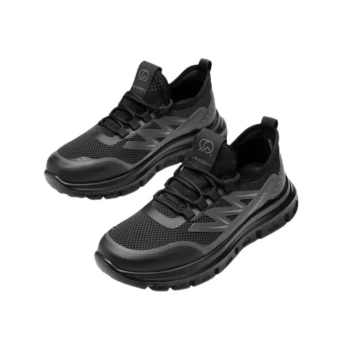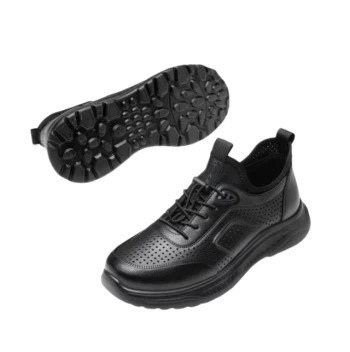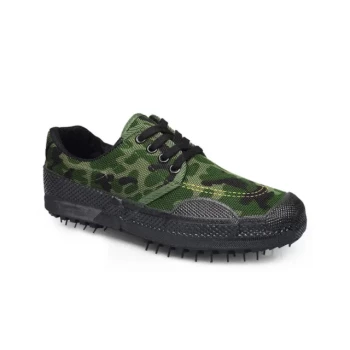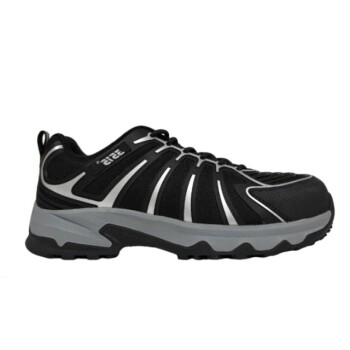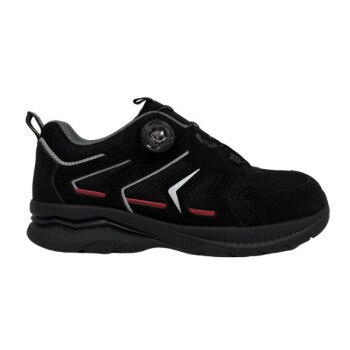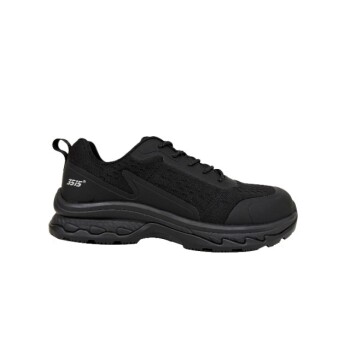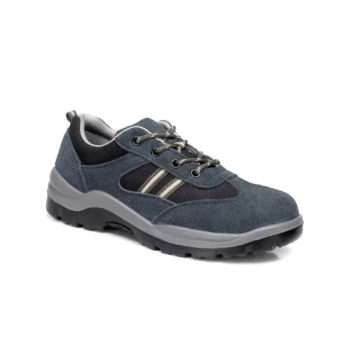The significance of sustainable materials in sneaker production is twofold: they fundamentally reduce the industry's environmental footprint and create a higher-quality product that meets the ethical demands of today's consumers. This approach moves beyond simple manufacturing to build brand value based on responsibility and durability.
The shift towards sustainable materials is not just an environmental trend; it's a strategic move that directly links ecological responsibility to superior product longevity and a stronger connection with eco-conscious customers.
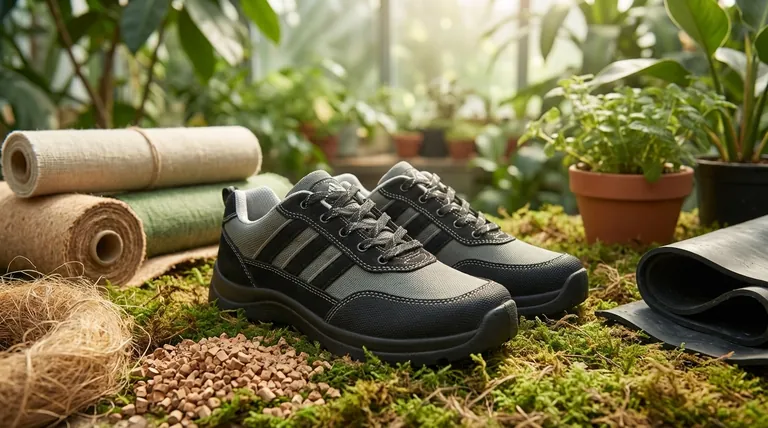
The Core Pillars of Sustainable Sneaker Design
Understanding the significance of sustainable materials requires looking at three key areas: environmental impact, product quality, and market alignment.
Reducing Environmental Impact
The primary driver for using sustainable materials is to lessen the environmental harm caused by traditional manufacturing.
This involves using recycled components, renewable resources, and less water-intensive processes, which directly cuts down on waste and pollution.
Enhancing Product Durability
Sustainable practices often correlate with higher-quality construction and materials, leading to a longer-lasting product.
Durability is a key component of sustainability. A shoe that withstands daily wear and tear for years doesn't need to be replaced, which is the most effective way to reduce consumption and waste.
Aligning with Consumer Values
Modern consumers are increasingly informed and prioritize brands that reflect their own values.
Offering products made from sustainable materials is no longer a niche advantage but a core requirement for brands wishing to connect with a growing demographic that demands transparency and ethical production.
Understanding the Trade-offs
While the benefits are clear, adopting sustainable materials is not without its challenges. True expertise requires acknowledging these complexities.
The Myth of the "Perfect" Material
No single material is perfectly sustainable. For example, traditional materials like high-quality leather and suede offer exceptional durability but raise questions about animal welfare and tanning processes.
Conversely, some recycled synthetic materials may solve a waste problem but can introduce other issues, like microplastic shedding. The key is a balanced and transparent approach.
The Impact on Cost and Accessibility
Sourcing high-quality, ethically produced materials can be more expensive than using conventional, mass-produced alternatives.
This cost can sometimes be passed on to the consumer, creating a potential barrier. However, many view this as an investment in a more durable product with a lower long-term environmental cost.
Making the Right Choice for Your Goal
Whether you are a consumer, designer, or brand manager, your priorities will shape how you approach sustainability.
- If your primary focus is maximum durability: Prioritize robust, high-quality materials like responsibly sourced leather or tightly woven mesh known for their ability to withstand long-term use.
- If your primary focus is minimizing environmental footprint: Seek out sneakers made from recycled plastics, plant-based alternatives, and materials certified by credible environmental organizations.
- If your primary focus is ethical alignment: Choose brands that offer complete transparency about their supply chain, labor practices, and the origin of their materials.
Ultimately, integrating sustainable materials transforms sneakers from disposable items into thoughtful, long-lasting investments.
Summary Table:
| Aspect | Significance |
|---|---|
| Environmental Impact | Reduces waste, pollution, and resource consumption. |
| Product Quality | Often correlates with higher durability and longevity. |
| Market Alignment | Meets the ethical demands of a growing consumer base. |
Ready to produce high-quality, sustainable sneakers that build brand loyalty?
As a large-scale manufacturer, 3515 produces a comprehensive range of footwear for distributors, brand owners, and bulk clients. Our production capabilities encompass all types of shoes and boots, including those utilizing sustainable materials and practices. We can help you create durable, market-aligned products that resonate with today's eco-conscious consumers.
Contact our experts today to discuss your sustainable sneaker production needs.
Visual Guide
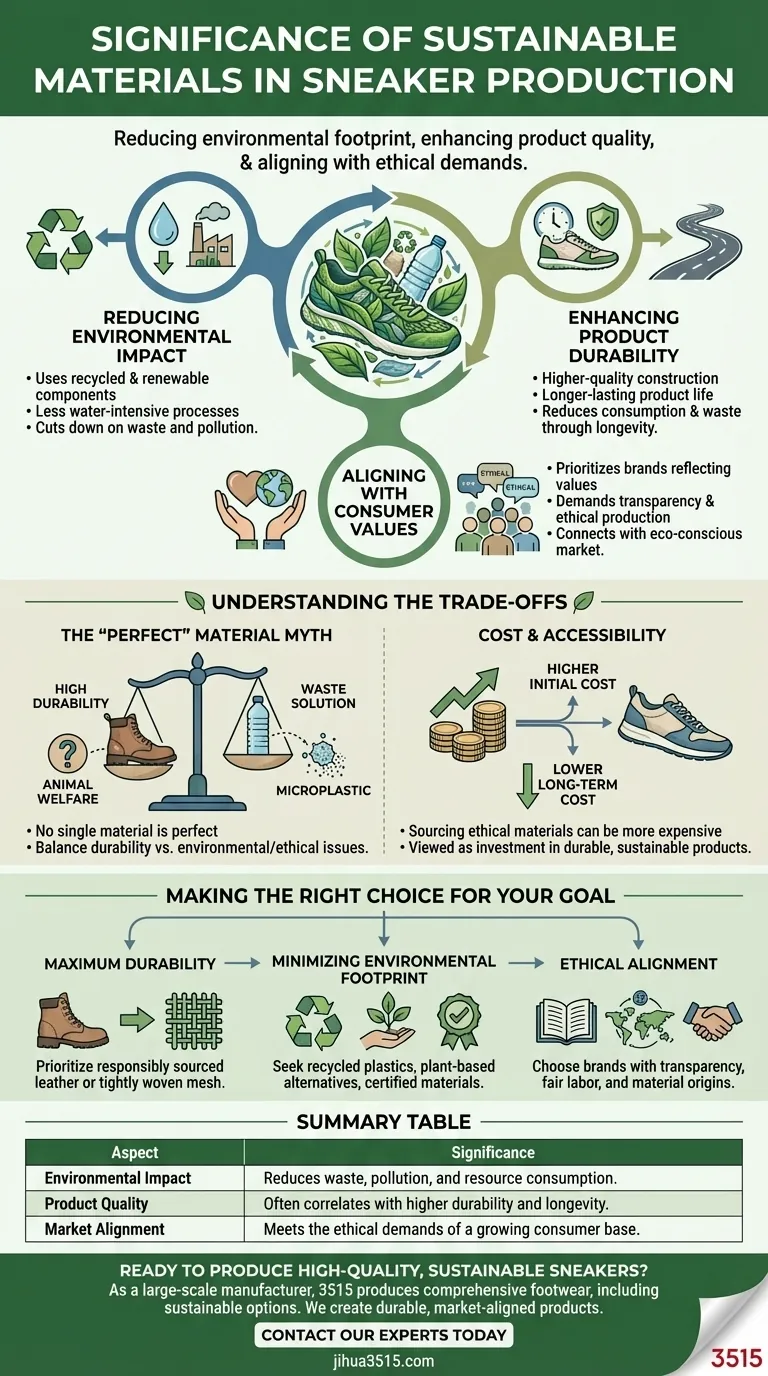
Related Products
- Durable Rubber-Soled Utility Shoes for Wholesale & Custom Brand Manufacturing
- Wholesale Lightweight Cushioned Athletic Sneakers for Custom Bulk Production
- Wholesale Smart Casual Sneakers with Dial Closure | Factory Direct Manufacturing
- Wholesale Comfortable Business Casual Shoes Custom Manufacturing
- Lightweight Breathable Sneakers with Wet-Traction Grip for Wholesale & Private Label
People Also Ask
- What is vulcanized rubber and why is it used in products? The Key to Durable, Flexible Footwear
- What makes rubber sole shoes an economical and practical choice? Unmatched Durability & All-Weather Value
- Which type of sole is better for premium sneakers and why? The Definitive Guide to Rubber Outsoles
- Why should we wear rubber soled shoes? Unlock Superior Safety and Durability
- What historical breakthrough in 1844 contributed to modern shoe sole manufacturing? The Vulcanization Revolution

